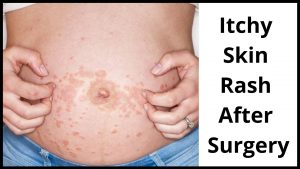
If you have had a surgical procedure and you are experiencing an itchy skin rash, you might be concerned that the procedure was something you need to avoid in the future.
Here are some of the things that can cause it:
1. Allergy To Anesthetic And Anesthesia Agents.
2. Dermatitis.
3.Blood Loss.
4. Wound That Was Accidentally Sewn.
5. Wrong Surgery.
6. Medications.
7. Infection.
1. Allergy To Anesthetic And Anesthesia Agents.
It is possible that you are allergic to one of the ingredients used during the procedure.
You may be surprised to learn that you are allergic to something other than what the doctor is telling you is causing it.
Many people who are having this problem are allergic to anesthetic and anesthesia agents that are used during surgery.
Before you decide to go through with a procedure, talk to your surgeon about it.
They may have a solution that will get rid of it for good and keep your skin free from allergy attacks in the future.
There are medications available that can help control these allergic reactions after the surgery.
Some people find that they become less sensitive to anesthetic when they take them.
You may also want to discuss this with the doctor to determine if you need to stop taking the medication before the surgery.
Don’t assume the symptoms are caused by the surgery.
If you have the same problem after some time, then it may simply be because the immune system has been weakened.
Take time to learn about your medical history before going into surgery.
Your family history and allergies may be causes of itchy skin rash after surgery.
You should also ask your surgeon any questions you might have about this problem.
2. Dermatitis.
Dermatitis is one cause of it.
You should understand that this form of it is very contagious.
It can be transferred by touching an area that has been affected by it.
Also, it is not a disease but is a type of rash that is caused by a fungus.
3.Blood Loss.
If you are wondering what causes it, sometimes the reason for itches after surgery can be because of blood loss.
During surgery, you may have lost blood or your doctor may have administered blood thinners that can cause an itchy skin rash.
You should understand that itchy skin rashes are common to all patients who have had a blood transfusion.
If you are concerned about an itchy skin rash after surgery, you should consult your doctor right away.
They will help you determine if your condition is caused by blood loss and if you have other problems to prevent it from happening again.
4. Wound That Was Accidentally Sewn.
The most common itchy skin rash after surgery is because of a wound that was accidentally sewn, or the site of an injury.
These are not the only things that can cause a wound to become irritated, but they are the most common ones.
5. Wrong Surgery.
Another, less common cause of an itchy skin rash after surgery is because of a surgery gone wrong.
Sometimes, this happens because of an injury or cut that may have been made.
Sometimes, it is due to a misalignment of bones in the area.
6. Medications.
An itchy skin rash after surgery can also be caused by a medication that has been used.
Some medications have ingredients that can irritate the skin.
Before taking any type of medication, it is a good idea to consult with your physician and to make sure that you are not allergic to any of the ingredients.
7. Infection.
Finally, an itchy skin rash after surgery can be caused by an infection.
If the infection goes untreated, it can spread throughout the body and it can cause damage to vital organs.
This is why it is so important to get the infection treated right away.
If the infection is not treated, it can spread to other parts of the body, making them irritated as well.
Once you have determined what is causing your skin rash, you can find a remedy that will get rid of it permanently.
Many doctors will suggest you stop using the offending cream or lotion and begin a course of steroid treatment immediately after you receive the diagnosis.

Prevention For Itchy Skin Rash After Surgery.
1. Do not scratch.
2. Use natural topical creams or lotions.
3. Change in diet or lifestyle.
4. Drinking plenty of water and Vitamin E.
5. Proper hygiene.
1. Do not scratch.
To prevent an itchy skin rash after surgery, it is very important do not to scratch your area when it is hurting or flaky.
Scratching irritates the skin and it could lead to more severe problems.
The rash will disappear on its own in about a week or two, but it might take up to a month for the skin to heal completely.
Once your skin rash is gone, you will have healthier, less irritated skin and will be able to enjoy a better quality of life.
2. Use natural topical creams or lotions.
If your rash persists, you may want to consider using natural topical creams or lotions that contain ingredients that will help you reduce your itching and rashes.
These remedies include aloe vera, witch hazel, tea tree oil, and jojoba oil.
This can lead to permanent scarring if you don’t treat it.
Your doctor will recommend a cream or lotion that contains aloe vera, which has proven beneficial for many people.
It can relieve itching and redness and also help to prevent scarring, so you can avoid scarring in the future.
These natural topical creams or lotions will provide a soothing effect on your skin.
They can also work to eliminate the itchiness, redness, and swelling that is often associated with the problem.
3. Change in diet or lifestyle.
If you are prone to allergies, your doctor may recommend a change in diet or lifestyle to reduce your chances of developing an itchy skin rash after surgery.
These suggestions may include eating a diet rich in vitamin E, avoiding certain foods, and drinking more water.
4. Drinking plenty of water and Vitamin E.
In order to reduce the inflammation that can cause a skin rash after surgery, drink enough water.
If you are dehydrated, the skin may inflame and become more sensitive to the anesthetic that is used.
Drinking plenty of water can help you avoid getting an allergic reaction to a specific ingredient that is in natural topical creams and lotions.
Vitamin E can also help reduce your sensitivity to the anesthetic agent that is used in most procedures.
5. Proper hygiene.
When it comes to treating an itchy skin rash, proper hygiene is the most important thing.
You should always wash your hands thoroughly after touching a sharp object or before and after eating.
When your hands are washed, ensure that you dry them completely.
This will help to reduce irritation and it will keep your hands as clean as possible.
The rash will eventually subside and heal.
You will feel much better and be able to enjoy a new skin texture and appearance after a few weeks.
If you have never had an itchy skin rash after surgery, you should talk to your doctor before using any type of cream or lotion.
You may not need the treatment at all.
Scarring from a rash after surgery can cause a great deal of embarrassment for those who are affected.
And can keep them from enjoying their lives.
When you have had the procedure performed, there are steps that you can take to decrease the risk of developing this condition in the future.

Natural Cures for Itchy Skin Rash.
Another best thing that you can do to stop the itching and burning is to do some natural cures.
What you can do is try to reduce the swelling and redness that are going on in the area of the surgery.
You can find many products that will help with this issue, such as:
1. Oatmeal baths – Oatmeal bath for itchy skin rash.
2. Aloe vera – Aloe vera for itchy skin rash.
3. Apple cider vinegar – Apple cider vinegar for itchy skin rash.
4. Mixture of lime and water for itchy skin rash.
5. Garlic – Garlic for itchy skin rash.
6. Drinking water for itchy skin rash.
7. Witch hazel – Witch hazel for itchy skin rash.
8. Tea tree oil.
9. Cranberry juice itchy skin rash.
1. Oatmeal baths – Oatmeal bath for itchy skin rash.
If an itchy skin rash after surgery occurs, you may want to apply some oatmeal paste on the affected areas for about 10 minutes to help reduce inflammation and dry the area out.
You may also want to apply witch hazel to the affected area.
Please note, that this is not one of the things you want to be doing right after a big surgery like a facelift, or even a breast reduction.
It is one of those “don’t do” things that should be avoided at all costs.
After all, we want to feel good and look good, not just appear that way.
There is no need to rub away the discomforts of having a “surgery gone wrong”.
Also, there are things that you can do to help you after such an event as well as things that you can do yourself to prevent a recurrence in future surgeries.
One of the things I would highly recommend is the use of a small amount of Oatmeal bath.
This is a simple solution that can help you feel better without the use of any harsh chemicals or creams that you normally would have to use.
You may even want to add some lemon essential oil to your bath water to make sure that your body is as clean and well-taken care of as possible.
The great thing about this is that it does not require you to make it over-the-top and make a large mess like you would if you applied a lotion with oatmeal and then washed it off afterward.
Oatmeal baths can be made at home too, but I would suggest using a tub that has an overflow tank.
You can purchase these at most hardware stores for under a hundred dollars.
By using this method, you will not only get the benefits of an Oatmeal bath for itchy skin rash after surgery.
But also the added benefit of cleaning out your skin properly with the added benefit of eliminating bacteria from your skin.
This is another way to get some relief.
2. Aloe vera – Aloe vera for itchy skin rash.
The other thing that you can do to stop the itching and burning after surgery is to apply aloe vera directly on the irritated area.
This natural product has anti-bacterial properties that will soothe the irritated skin and will relieve the itching.
If you want to use aloe vera gel, you just apply it directly to the area and massage it in, so as not to spread it all over.
Aloe vera gel can be a great solution to stop the itching and burning after surgery.
Again, just use a few drops of aloe vera gel directly onto the rash and massage it in. This will reduce any inflammation.
This is because it has the ability to relieve the itching and burning sensation that people experience after surgery.
In addition, it can also be helpful in reducing swelling and redness that may occur after a mastectomy.
While the Aloe Vera plant has a lot of wonderful benefits for humans, the plant has a reputation as a source of relief for patients.
Patients suffer from a number of different health problems, including allergies, colds and coughs, arthritis, asthma, skin irritations, and even skin rashes after surgery.
The fact that Aloe Vera plants can relieve itchy skin after surgery makes it ideal for skin rash treatment, but the healing properties of the plant can be very beneficial.
The main reason why Aloe Vera is known to have anti-bacterial, anti-fungal, and anti-viral properties is due to the presence of a natural anti-inflammatory.
When you have surgery, the body immediately produces cytokines that cause inflammation.
And this is when anti-inflammatories such as aloe Vera can help balance out the body’s inflammatory response.
It is believed that the Aloe Vera plant also has anti-depressant properties, which is why it is a great treatment for insomnia.
In addition, Aloe Vera plants are very useful in relieving stress.
And they also make great gifts for those on special occasions such as birthdays or anniversaries.
3. Apple cider vinegar – Apple cider vinegar for itchy skin rash.
Another great remedy for your itchy skin rash after surgery is apple cider vinegar.
Apple cider vinegar() has acetic acid and always been used as a wound disinfectant and antiseptic.
It has many health benefits, including its ability to soothe the body and skin.
Just use a little on a cotton ball and rub it into the skin to soothe any irritation that may be going on. It can also soothe the itching.
The reason why you want to do this is to help to relieve the itching sensation.
You should make sure that you are using a cotton towel or cloth that is non-absorbent so that there will be no type of residue left on the area where you had the surgery performed.
Also, you should also make sure that you are using vinegar with a neutral pH level to make sure that it will not cause any type of skin irritation.
If you use a vinegar that has a slightly acidic pH level, then you could be causing your skin to have an allergic reaction.
It is best to only use vinegar with a slightly alkaline pH level.
This will help to reduce any type of sensitivity to the vinegar.
4. Mixture of lime and water for itchy skin rash.
Also, a good natural cure to stop the itching and burning is to make a paste out of a mixture of lime and water.
If you make this mix regularly it will work wonders in the area.
So make sure to drink plenty of water in order to flush out all the chemicals that were used to perform your surgery.
The most common cause of a rash is an allergic reaction that can be treated easily by applying a mixture of lime and water for itchy skin rash after surgery.
This natural method is very effective and works well on both types of rashes like eczema, psoriasis, and rashes caused due to injury.
Lemon has antimicrobial effects and has the capacity to curb Propionibacterium acnes bacteria which can cause inflammatory acne.
Likewise, it contains antifungal effects that can be used to treat Candida rashes.
The natural mixture is applied to the affected area after the first cleansing it with warm water.
You need to also keep the affected area clean at all times as the skin in this area is very sensitive.
It is best that you do not use too much.
It is better that you keep a good balance between the amount of lime juice that you need to use with the amount of water.
The lime juice will also help to reduce the swelling and pain.
However, if you want to be sure about the effects of this mixture of lime and water for itchy skin rash after surgery, you can consult your doctor or dermatologist.
5. Garlic – Garlic for itchy skin rash.
Another very common thing that you can use is garlic.
Garlic has been shown to stop inflammation and can be applied to the area as a paste.
Also, Garlic has a strong effect on the immune system and increases the immune system’s ability to heal itself.
Garlic is used to fight infections in many different ways including the skin.
You will find it has the ability to cure any type of infection of yeast infections to even ear infections.
One thing that you will find is that garlic can also help to kill the infection and will help to make sure that you heal faster.
There are a few different ways that you can use garlic to get rid of the itch after surgery.
The first way to use garlic is to cut the garlic in half and place it on the area that is itching.
Leave the garlic there for a few hours and then wash it off with water.
Another way to use garlic for itchy skin rash after surgery is to wrap it in cheesecloth and then insert it into the area that is causing the rash.
This should give you relief and you will notice that you will not have to scratch at all after the surgery.
Also, people should consider taking garlic supplements or topical treatment to help alleviate the pain and itching that they experience after surgery.
Although it can be difficult to take in a daily amount of garlic, consuming the right amount at the right time can help to reduce the discomfort.
6. Drinking water for itchy skin rash.
Many people are under the impression that when you have surgery there is no way to prevent the onset of itchy skin rash after the surgery.
While this can be true in many cases it is very difficult to say that an individual will never develop this problem after surgery.
Some doctors suggest that you consume a lot of water after surgery so that your body will be properly hydrated and you will be able to properly repair any damage that has been done by your surgery.
In other cases, doctors will suggest that you eat an adequate amount of food so that you can begin repairing whatever that was damaged from your surgery.
It is very important to understand that when you are looking at how to apply to drink plenty of water for itchy skin rash after surgery you should be doing it naturally.
Also, it is important to make sure that you are drinking plenty of water so that you do not become dehydrated.
When you are dehydrated your body will be unable to heal properly.
You will also find that your blood sugar levels may fall quite low, which can lead to some very nasty side effects.
When you are dehydrated you will find that your skin is much more sensitive and it is harder to treat.
And when you are looking into how to apply to drink plenty of water after surgery you should not take this task lightly.
You need to make sure that you are drinking a large quantity of water each day to help flush the toxins out of your body.
When you drink plenty of water, your skin is going to feel much more hydrated which means that it will heal much easier.
You should make sure that you are taking advantage of the opportunities that you are going to have after surgery to use the water that you are consuming as much as possible.
7. Witch hazel – Witch hazel for itchy skin rash.
Witch hazel is known as a great healing product because of its ability to soothe and heal the skin.
It has an anti-bacterial component that will help to kill off the bacteria that are responsible for your rash.
And it can also help you reduce the itching, burning, and swelling that come with the rash as well.
The application of witch hazel for itchy skin rash can be performed by just applying the mixture on the affected area.
Once it has been applied, you can massage the area gently so that the Witch hazel is able to penetrate into the skin.
Some people prefer to apply the solution on a cotton ball before placing it on the skin and rubbing it gently.
Another way of using it is by taking it on the cotton balls and then spreading it evenly on the affected area.
It can also be massaged gently on the affected area before applying it to the body.
The combination of application and massage helps in treating all types of skin diseases and irritations.
As there are no side effects when you use this natural product, it is considered a good cure for itchy skin rash.
8. Tea tree oil for itchy skin rash.
How to apply tea tree oil to your skin after surgery depends on the severity of the rash that you have.
If you have a very mild rash then tea tree oil can be applied topically as a treatment.
And if the rash is more severe or if it has become extremely itchy and irritated then the cream should be used on the affected area.
The tea tree oil cream is not meant to be used all over the affected area, as it can cause irritation to sensitive areas of the skin.
However, it can be used to close up the area that has been affected by the rash.
One of the best benefits of using this oil is that you will not have to worry about any allergic reactions.
Applying the oil directly to the affected place is what you need to do.
There are many people who have reported that using this cream after they started using the oil worked out for them.
A lot of people have used tea tree oil on their affected area to soothe the rash.
You should try to choose a product that uses natural ingredients and which has a good reputation in the market.
9. Cranberry juice itchy skin rash.
One of the most important things that you can do to help reduce inflammation and heal your itchy skin is to drink cranberry juice.
Cranberry has got anti-bacterial, anti-viral, and anti-inflammatory properties.
It is believed that cranberry juice can provide the body with all the vitamins and minerals it needs to repair itself.
Cranberry juice also contains phytosterols, which help to eliminate toxins from the body.
This helps to detoxify the body and helps your immune system to work properly to fight off the infection that is attacking you.
You can easily do so by simply using it as a compress, or you can also mix it with your favorite drink.
Cranberry juice is a good natural cure for itchy skin rash.
But you have to make sure that the product you will use is not too sweet since too much sugar can worsen the condition of skin condition.
The best method in knowing how to apply unsweetened cranberry juice for itchy skin rash after surgery is by using it on the affected area.
Apply it on your face and the rest of the body as well.
Don’t be shy to apply this juice to your entire body.
This is a great way to prevent your skin from becoming dry after your surgery.
One thing to know about cranberry juice is that it not only provides relief for the symptoms that are causing your itchy skin rash.
But also helps to restore the body to its original state of health.
Another way that cranberry juice can help is by helping the body get rid of toxins that are building up in the body.
The body is constantly being bombarded with toxins from the foods that we eat as well as the air we breathe.
When these toxins get trapped in the body they can cause all kinds of problems such as heart disease, cancer, and more.
By drinking cranberry juice after surgery you can help to remove these toxins from the body.
These toxins can build up and cause a lot of damage to the body.
If you drink juice after surgery, then you will be helping to remove these toxins so that your body can work properly again.
As you can see, there is no reason why you should not drink cranberry juice after surgery.
This is a great way to ensure that you are getting the nutrients that your body needs.
And this will help to give your body the energy it needs to repair itself and to fight off any infection that might be attacking your body.
This is an effective solution if you want to avoid skin problems after surgery.
The use of natural products in order to treat rashes after surgery is very beneficial for the body and the skin.
And should never be done in a way that will irritate the affected area further.
To treat a skin rash after surgery, one should try their best to find a product that will help get rid of the rash in the most natural manner.
If you really want to stop the itching and burning after surgery, you may want to consider one of the natural remedies above.
And if none of the natural cures mentioned above works, then you may want to seek advice from your surgeon to see what kind of treatment they recommend.
Sometimes they may have other prescriptions that you can take that will treat the problem.
These natural cures are easy to do not require any type of prescription drugs or surgery.
The last thing you want is to do is use steroids or other chemicals after the surgery.
Natural cures are proven to be effective and safe to use with minimal side effects.
Do not worry too much if you do not get relief right away, because you should expect to have an outbreak of itchy skin rash after surgery.
In fact, it may last for several weeks or months.

How Common Is It To Have A Rash After Surgery?
When you think about your surgery, how many times do you wonder, “How common is it to have a rash after my surgery?”
However, this can vary.
So also there are some things that may be the ones that trigger your rash after the surgery.
1. One of the most common causes of this is an allergic reaction.
2. Another one of the most common causes is scar tissue.
3. The third common causes of a rash after surgery are infections and viruses.
4. Also another one of the most common causes of rashes after surgery is an allergic reaction.
5. Another one of these common causes of rashes after surgery is infection.
6. Use antibiotics during your recovery.
7. Yeast infection.
1. One of the most common causes of this is an allergic reaction.
This is a very common symptom, and many times the person will ask the surgeon if it will come back.
However, the doctor usually will not prescribe any medications, as they have already done everything in their power to help prevent the rash.
This can be a big mistake, especially if your rash is severe.
2. Another one of the most common causes is scar tissue.
This is caused by the new skin that was removed.
After surgery, the skin will become swollen, and this is usually due to the loss of skin.
Many times, doctors will advise that you continue to use cortisone cream or lotion for weeks to help stop the scarring from occurring.
There are several other types of medications that are used to treat a rash after surgery, but there is really no one drug that will completely help.
It is important that you are careful to keep yourself hydrated while you are healing because dehydration can lead to an infection.
3. The third common causes of a rash after surgery are infections and viruses.
If you use antibiotics, your body is going to become accustomed to the antibiotics, so that they can help fight off the infections.
Unfortunately, this is when the skin becomes more sensitive and will break out in this way.
4. Also another one of the most common causes of rashes after surgery is an allergic reaction.
This is where the skin is inflamed by a chemical substance that is present in the surgical procedure, like steroids or anesthesia.
When this occurs, the person may suffer from redness, blistering, and an itching sensation of burning.
5. Another one of these common causes of rashes after surgery is infection.
In this case, the person will often notice an irritated area, and possibly a crusty white-looking scar after the surgery, which will often look a little bit gross.
When it comes to treating a rash after surgery, knowing how common it is to have a rash after your surgery, can be a huge relief.
These are some of the main causes of rashes after surgery, and you can avoid them by making sure that you stay hydrated after surgery, and keeping yourself clean.
There are many other factors that can lead to rashes, but if you can keep a close eye on your skin during recovery, you should not have any problems.
6. Use antibiotics during your recovery.
If you use antibiotics during your recovery, you will find that this can lead to an infection that may result in a rash.
And if this is the case, then you may find that you can eliminate the infection by applying ice or cold compresses on your body until it is gone.
7. Another of the more common reasons why rashes after surgery occur is a yeast infection.
Again, it is important to keep in mind that once the infection is gone, you should keep yourself clean and hydrated until the infection is gone.
You can prevent rashes after surgery by keeping yourself clean and hygienic, especially when you have been injured.
Keep in mind that there are several different things that can contribute to infection, including a rash after surgery, so try to avoid using these items if possible.
Although rashes after surgery may be common, and sometimes a doctor may recommend them, it is not necessary to take them as seriously.
A rash can usually go away on their own, as long as you know what they are, and keep yourself hydrated.
In fact, the best thing to do is to make sure that you avoid rashes after surgery as much as you can.

CONCLUSION.
Many people are experiencing a rash after their operation but it can be so annoying that you would want to know if there is a way that you can avoid the Itchy Skin Rash After Surgery.
There are several ways that you can get rid of the rash but before you jump into any one of them, you will need to know what it really is.
Most people would just go to the doctor and get their rash treated and this can be a good thing.
But if you don’t know what’s causing it then you could end up having a relapse and your doctor will not know how to treat it.
You need to understand that rash is just the body’s way of telling you that something is wrong with your body.
There are many different things that could cause a rash.
So don’t think that because you have had surgery that it was the only thing that could be causing it.
A lot of people think that a skin rash after surgery is caused by infection and this could be the case.
But many doctors will not believe this because a lot of people who have had surgery for some reason never get an infection after the procedure.
The best thing to do is take a look at the area after your procedure and make sure that it is completely healed.
Once you’ve done that, then it’s time to find out what is causing it.
You may have a yeast infection or another condition that is causing your rash.
If you do have an infection, then you can treat it right away so that you don’t have any more problems.
However, if you’re not sure what it is that you have, then it’s best to consult with your doctor to get them to look it over.
If they find that it is not harmful then you can be sure that you can avoid a rash.
Getting Rid of the Itchy Skin Rash After Surgery isn’t hard at all.
You should be able to avoid it if you take a look at your area right after the procedure.
Try to see what you can do in order to heal it up fast.
Many times it’s easy to treat, especially if it’s the kind of rash that just comes and goes.
If you don’t have any other symptoms then you probably won’t have to worry about the rash.
However, it’s always a good idea to take a look at the area where it is located in order to make sure that it’s OK to get back into.
And as soon as you can.
